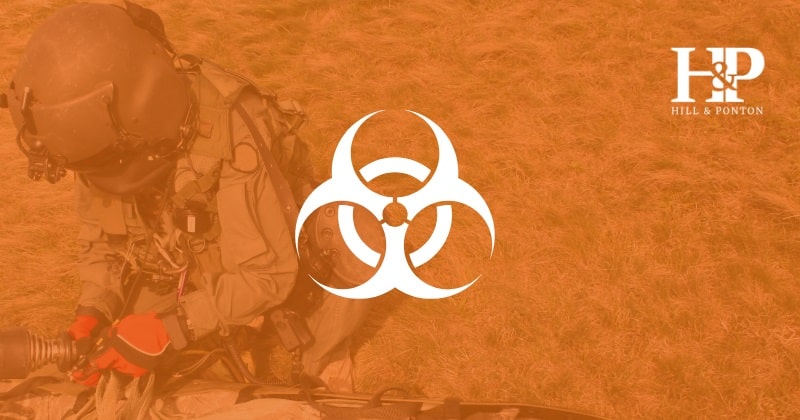Use of Defoliants and the military
Defoliants are chemicals used to kill weeds and unwanted plants, typically in agricultural areas, but also as an aid in combat theaters. The first defoliants were investigated by the military during World War II. English, then the United States considered using defoliants to destroy Axis crops, causing food shortages, although the plans never came to fruition. Studies continued after the war and experiments performed by British troops which led to the precursor of Agent Orange, the most famous defoliant due to its use in the Vietnam war.

Defoliants in Vietnam War
During the Vietnam war, chemical defoliants were field tested in South Vietnam as Project AGILE. The success of this program led to the formal herbicide program Trail Dust from 1961-1971. Programs under Operation Trail Dust included Operation Ranch Hand, where defoliants were sprayed from aircraft over large portions of forests. During the Vietnam war, the US Military made the distinction of tactile herbicides, defoliants used for combat operations and commercial herbicides, defoliants used for foliage control on bases to reduce the risks of wildlife, insects, and infections. Unfortunately, the same active ingredients were used for both tactile and commercial herbicides so, chemically, they were the same type of defoliants with an increased risk of adverse health effects in humans.
During the Vietnam war, several different types of defoliants were used as tactile herbicides, each with their own chemical makeup and types of plants they targeted.
- Agent Orange:
- Broadleaf plants, woody shrubs, trees
- Used 1965 – 1970
- 2,4,5-T & 2,4-D
- Agent Orange II: used after 1968
- Agent White:
- Broadleaf plants, woody shrubs, trees
- Used from 1966 – 1971
- 2,4-D & picloram
- Agent Blue:
- Grasses & grains
- Used from 1962 – 1971
- Cacodylic acid & sodium cacodylate
- Agent Purple
- Broadleaf plants, woody shrubs, trees
- Only used between 1961 – 1965
- 2,4-D & 2,4,5-T
- Agent Pink
- Broadleaf plants, woody shrubs, trees
- Only used prior to 1964
- 2,4,5-T
- Agent Green
- Broadleaf plants, woody shrubs, trees
- Only used prior to 1963
- 2,4,5-T

When 2,4-T and 2,4,5-T combines to cause a plant to lose it leaves, the process releases significant amounts of TCDD. TCDD was not added to Agent Orange but is a byproduct of the process caused by defoliation. TCDD is also a by product of burn pits, bleaching, and burning of gas and coal due to the chemical reaction caused by combustion.
Agent Orange use in the military
Agent Orange made up the major amount of defoliant used during the Vietnam war with almost 43 million liters, or 11.4 million gallons sprayed; 60% of all the herbicides used during the war. Agent White, which contained no 2,4,5-T (needed to create dioxin) came in second with only half the amount sprayed, 22 million liters.
Between 1961 and 1971, US troops sprayed herbicides, specifically Agent Orange, for several reasons:
- Destroy forest cover to locate enemy troops,
- Clear vegetation to prevent sneak attacks, and
- Destroy food crops used by the North Vietnamese and Viet Cong forces.
During the program Operation Ranch Hand, crops and water sources of non-combatant populations and military troops were also contaminated. This included food and water brought onboard ships and transported to troops in nearby bordering countries. Agent Orange was also sprayed in Laos, Cambodia, Thailand, Panama (aquatic vegetation control), Subic Bay in the Philippines, and several other areas, though no recognition by US government or the VA has yet been conceded other than on a case by case basis.

What are the health effects of defoliants?
The following conditions are presumptive for VA disability if you were exposed to the dioxin (a carcinogen) caused by Agent Orange, TCDD:
- Chronic B-cell leukemia,
- Ischemic heart disease,
- Diabetes type 2,
- Hodgkin’s disease,
- Non-Hodgkin’s lymphoma,
- Multiple myeloma,
- Chloracne,
- Soft tissue sarcoma,
- Prostate cancer,
- Respiratory cancers,
- AL amyloidosis,
- Parkinson’s disease,
- Early onset peripheral neuropathy (CIDP), and
- Porphyria cutanea tarda.
However, there are many other health concerns that may be linked to TCDD or defoliants that the VA does not find as presumptive. These include:
Hypertension Immune system dysfunctions Muscular dysfunctions
Spina bifida Fetal brain and nervous system development
Hepatitis Bladder cancer Breast cancer
Colo-rectal Cancer Peripheral artery diseases Hypercholesterolemia *
Liver cancer Stomach cancer Thyroid cancer
*Hyperchilesterolemia is not considered a disability by the VA, but some conditions may be secondary.
VA Benefits for Defoliants

If a Vietnam veteran has one of the 14 listed conditions that are presumptive, the VA will grant disability compensation based on a diagnosis and proof of service in one of the current conceded areas for Agent Orange Exposure. These include:
- Service in Vietnam
- Service on Navy or Coast Guard ships that served on inland waterways or within 12 miles of the coastline
- Served in Lorea during the Vietnam war in or near the DMZ between 9/1/67 and 8/31/71
- Served perimeter duty on RTAF bases in Thailand (including U-Tapao, Ubon, Nakhon, Phanom, Udorn, Takhli, Korat, or Don Muang or any Army installation in Thailand
- Served in the US Air Force where a C-123 aircraft with Agent Orange was assigned and you were put in regular contact with that aircraft, or were a Air Force Reservist who was assigned to Lockbourne/Rickenbacker AFB OH from 1969-1986 or Westover Air Force Base MA from 1972-1982 or Pittsburg International Airport PA from 1972-1982.
- Were part of testing or storage of Agent Orange during your active duty military service.
If you do not meet the above criteria and feel that your condition is related to, or you were exposed to Agent Orange, you can still file a claim for direct service connection (rather than presumed) by providing information that links your condition to exposure and provides circumstances that show you were more than likely exposed to Agent Orange.
Benefits for Agent Orange claims include healthcare, disability compensation, and sometimes health care of children born with birth defects such as a genetic disorders due to their parent’s exposure. If you need help with a VA disability claim, please feel free to contact us.




